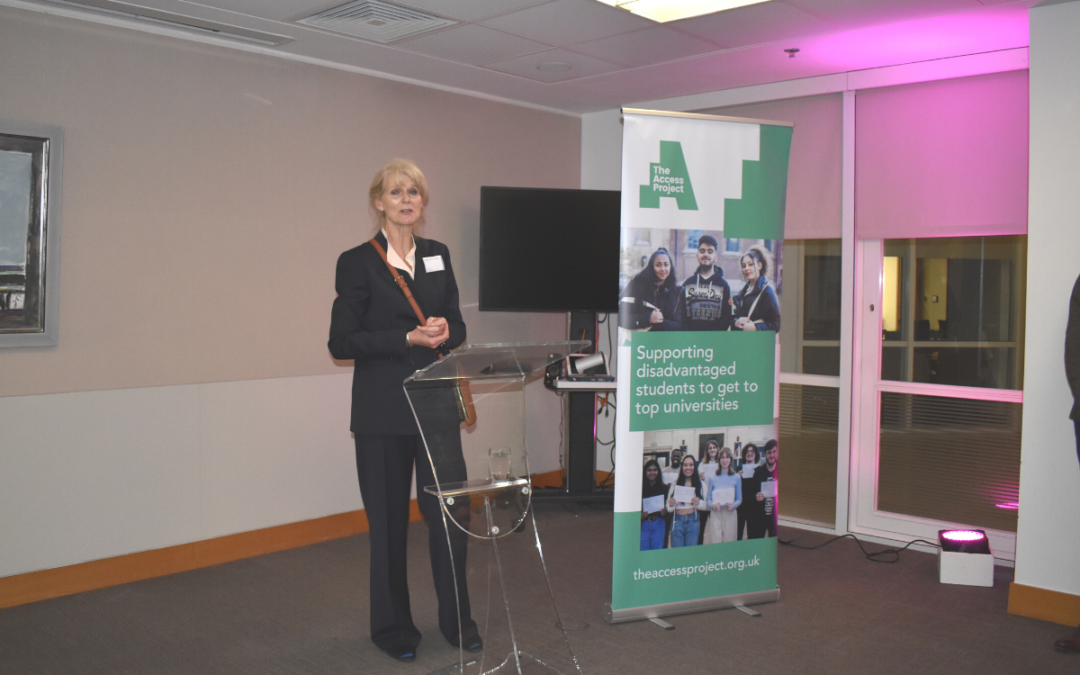On Wednesday 17 November, we said goodbye to former Chair Mary Curnock Cook CBE at an event at Linklaters.
Eight years of levelling the playing field
Mary Curnock Cook has sat on the board of The Access Project for eight years – and has been our Chair for the past four. Since being a board member the organisation has:
- Grown from supporting six schools to 35 across the country – including in new regions like West Yorkshire
- Increased the percentage of students placing at top third universities year-on-year since 2016/17. It has gone from 53% in 2016/17 to 69% in 2019/20
- Monitored and evaluated the programme to ensure we are delivering the best results for our students
- Been selected as a tuition partner on the government’s flagship National Tutoring Programme.
Mary’s goodbye event
The Access Project organised a goodbye event at corporate partner Linklaters’ offices in London. Guests – including partners, board members and staff – heard from Mary, as well as one of our alumni Jakaria. Jakaria is currently studying Medicine at UCL (one of our university partners) after securing five A*s at A levels.
Jakaria has said of his time at The Access Project: “The last four years have enabled me to be more ambitious and aim for the top grades that The Access Project believed I could achieve.” Read more about our work with Jakaria here.
Our new Chair, Andrew Johnson, who has recently started in his new role, also spoke at the event. Andrew is a founding Partner at Beaumont Capital, investing in early stage high growth marketing technology and data businesses.
Chief Executive, Nathan Sansom, said: “We are sad to say goodbye to Mary Curnock Cook. I personally have enjoyed my time working with Mary enormously and have learnt so much from her wealth of experience in the education sector. The Access Project is at a new stage of its journey and faces new challenges – particularly around our expansion into new regions. We look forward to working with our new Chair, Andrew Johnson, whose expertise in growing organisations will be enormously valuable.”
What Mary had to say at the event
“I’m here with a touch of sadness as my formal association with The Access Project came to an end last month. It’s the second longest trusteeship that I’ve ever held, and the last four as Chair of this wonderful organisation.
“I couldn’t be prouder of my colleagues and former colleagues at The Access Project who have, over that period, turned the organisation into the professional, impactful and frankly amazing organisation that it has become today.
“Back when I first started, The Access Project was active only in six schools and they were all in London. It was certainly professional enough – enough at least to start seeing real results from its work supporting students and chalking up some impressive results in helping them progress to Russell Group and other selective universities.
“With just six schools in the programme back then, we were probably working with fewer than 250 students and a Year 13 progression cohort of no more than about 60 students.
“Only 4,540 of the most disadvantaged young people made it to a top university last year. We supported 240 from a similar demographic to that group to place at top universities – that’s almost 5% of the entire cohort.
“I got involved with The Access Project because I knew the formula was spot on for what is needed to support successful progression to top universities. That is, all the support that you would expect to see in practically every private school in the country:
- Someone in school – our University Access Officers – whose job it is to keep students focussed on their university goals
- Someone to help them make the right subject choices for the courses they are interested in
- Someone to help them navigate the UCAS application process – where to apply, when to apply, which offers to reject and which to accept
- Someone to make sure they get to open days so they’re making informed choices about their futures
- And sometimes someone also to help navigate Clearing if things didn’t quite run to plan after exam results.
“And believe me, if no one in your family has been to university, perhaps no one in your community has been, navigating all that without any support is tough!
“Not only that, but also access to volunteer private tutors to help them get the grades they need – first at GCSE which is a key hurdle deciding whether someone even studies for A levels, and then at A level when the university offers are grade dependent.
“More recently, we’ve started to put in support during that crucial first year of transition to university life which can be quite daunting if you’ve never lived away from home and you’re being flung into a new environment with new people and with none of the certainties of the familiar rhythm of the school day which has been the heartbeat of your life for the past twelve years.
“Basically, there’s no point getting in if you don’t get on once you get there.
“I’m also proud that we’re now also supporting schools outside London – twelve so far – four in the East Midlands, six in the West Midlands and two in West Yorkshire.
“Most of you probably know that London has university progression rates way above the average rates in other regions, so growth outside London is critical to our mission to help the students and schools who most need our help.
“Our impact reporting is informed by UCAS tracking data which shows that between 80 and 90% of our students go to university each year and that nearly 70% of them go to our target top third universities – including to some of the elite courses at Oxbridge or at medical schools. The Access Project students are between two and four times as likely to go to these top universities as other students with similar backgrounds.
“It’s a fabulous story of success and I take my hat off to the team at The Access Project who have kept doggedly at the task of refining and improving our support package, at cajoling and training volunteers to tutor our students, and at raising awareness of the inequity of opportunities faced by so many young people so that generous donors provide the financial support for this life-changing programme.
“So now it’s time for me to hand on the baton to our new chair, Andrew Johnson. I can sleep easy knowing that you’ll be spear-heading a new phase of growth and achievement for The Access Project and for our wonderful students and staff.
“I wish all of you – Andrew, our trustees, Nathan and The Access Project team every possible good wish for the future. It’s been the privilege of my life to serve with you for a cause that is so important. I love that we have the opportunity to change young people’s lives and along the way, I believe they have changed my life too.”

